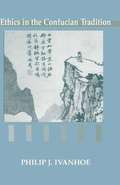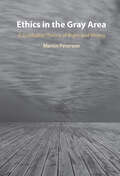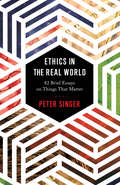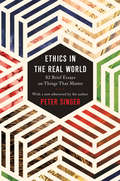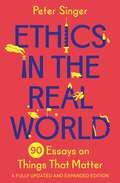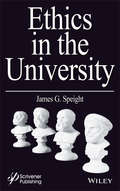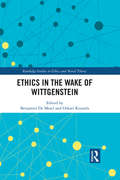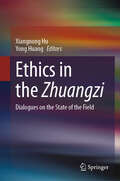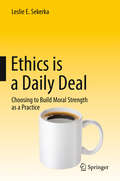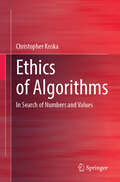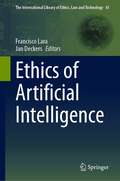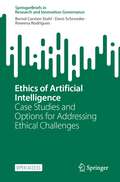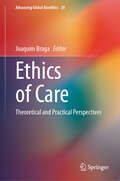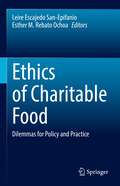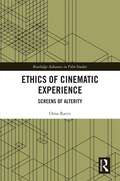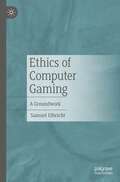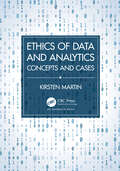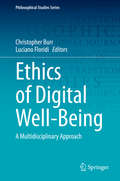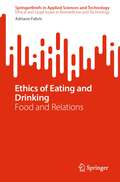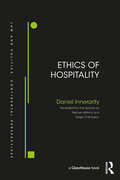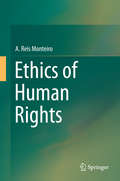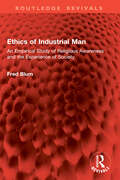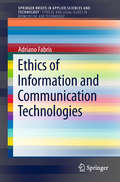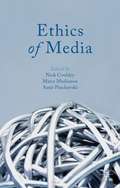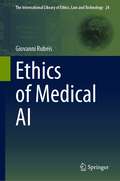- Table View
- List View
Ethics in the Confucian Tradition: The Thought of Mengzi and Wang Yangming (Second Edition)
by Philip J. IvanhoeThis volume serves both as an introduction to the thought of Mengzi (Mencius) and Wang Yangming and as a comparison of their views. By examining issues held in common by both thinkers, Ivanhoe illustrates how the Confucian tradition was both continued and transformed by Wang Yangming, and shows the extent to which he was influenced by Buddhism.
Ethics in the Gray Area: A Gradualist Theory of Right and Wrong
by Martin PetersonWhat should morally conscientious agents do if they must choose among options that are somewhat right and somewhat wrong? Should one select an option that is right to the highest degree, or would it perhaps be more rational to choose randomly among all somewhat right options? And how should lawmakers and courts address behaviour that is neither entirely right nor entirely wrong? In this first book-length discussion of the 'gray area' in ethics, Martin Peterson challenges the assumption that rightness and wrongness are binary properties and explores acts which are neither entirely right nor entirely wrong, but rather a bit of both. Including discussions of white lies and the permissibility of abortion, Peterson's book presents a gradualist theory of right and wrong designed to answer these and other practical questions about the gray area in ethics.
Ethics in the Real World: 82 Brief Essays on Things That Matter
by Peter SingerPeter Singer is often described as the world's most influential philosopher. He is also one of its most controversial. The author of important books such as Animal Liberation, Practical Ethics, Rethinking Life and Death, and The Life You Can Save, he helped launch the animal rights and effective altruism movements and contributed to the development of bioethics. Now, in Ethics in the Real World, Singer shows that he is also a master at dissecting important current events in a few hundred words.In this book of brief essays, he applies his controversial ways of thinking to issues like climate change, extreme poverty, animals, abortion, euthanasia, human genetic selection, sports doping, the sale of kidneys, the ethics of high-priced art, and ways of increasing happiness. Singer asks whether chimpanzees are people, smoking should be outlawed, or consensual sex between adult siblings should be decriminalized, and he reiterates his case against the idea that all human life is sacred, applying his arguments to some recent cases in the news. In addition, he explores, in an easily accessible form, some of the deepest philosophical questions, such as whether anything really matters and what is the value of the pale blue dot that is our planet. The collection also includes some more personal reflections, like Singer's thoughts on one of his favorite activities, surfing, and an unusual suggestion for starting a family conversation over a holiday feast.Provocative and original, these essays will challenge--and possibly change--your beliefs about a wide range of real-world ethical questions.
Ethics in the Real World: 82 Brief Essays on Things That Matter
by Peter SingerPeter Singer is often described as the world's most influential philosopher. He is also one of its most controversial. The author of important books such as Animal Liberation, Practical Ethics, Rethinking Life and Death, and The Life You Can Save, he helped launch the animal rights and effective altruism movements and contributed to the development of bioethics. Now, in Ethics in the Real World, Singer shows that he is also a master at dissecting important current events in a few hundred words.In this book of brief essays, he applies his controversial ways of thinking to issues like climate change, extreme poverty, animals, abortion, euthanasia, human genetic selection, sports doping, the sale of kidneys, the ethics of high-priced art, and ways of increasing happiness. Singer asks whether chimpanzees are people, smoking should be outlawed, or consensual sex between adult siblings should be decriminalized, and he reiterates his case against the idea that all human life is sacred, applying his arguments to some recent cases in the news. In addition, he explores, in an easily accessible form, some of the deepest philosophical questions, such as whether anything really matters and what is the value of the pale blue dot that is our planet. The collection also includes some more personal reflections, like Singer’s thoughts on one of his favorite activities, surfing, and an unusual suggestion for starting a family conversation over a holiday feast.Now with a new afterword by the author, this provocative and original book will challenge—and possibly change—your beliefs about many real-world ethical questions.
Ethics in the Real World: 90 Essays on Things That Matter – A Fully Updated and Expanded Edition
by Peter SingerProvocative essays on real-world ethical questions from the world's most influential philosopherPeter Singer is often described as the world's most influential philosopher. He is also one of its most controversial. The author of important books such as Animal Liberation, Practical Ethics, Rethinking Life and Death, and The Life You Can Save, he helped launch the animal rights and effective altruism movements and contributed to the development of bioethics. Now, in Ethics in the Real World, Singer shows that he is also a master at dissecting important current events in a few hundred words.In this book of brief essays, he applies his controversial ways of thinking to issues like climate change, extreme poverty, animals, abortion, euthanasia, human genetic selection, sports doping, the sale of kidneys, the ethics of high-priced art, and ways of increasing happiness. Singer asks whether chimpanzees are people, smoking should be outlawed, or consensual sex between adult siblings should be decriminalized, and he reiterates his case against the idea that all human life is sacred, applying his arguments to some recent cases in the news. In addition, he explores, in an easily accessible form, some of the deepest philosophical questions, such as whether anything really matters and what is the value of the pale blue dot that is our planet. The collection also includes some more personal reflections, like Singer’s thoughts on one of his favorite activities, surfing, and an unusual suggestion for starting a family conversation over a holiday feast.Provocative and original, these essays will challenge—and possibly change—your beliefs about a wide range of real-world ethical questions.
Ethics in the University
by James G. SpeightIt is the continuous reports of unethical behavior in the form of data manipulation, cheating, plagiarism, and other forms of unacceptable behavior that draw attention to the issues of misconduct. The causes of misconduct are manifold whether it is the need to advance in a chosen discipline or to compete successfully for and obtain research funding. Disappointingly, individuals who are oriented to any form of dishonesty are individuals who had previously displayed little or no consideration for the feelings of others and are therefore more interested in themselves, at the expense of the students, and others recognizing them by any means necessary. This ground-breaking and honest examination of ethics in the university setting is unabashed in its descriptions of misconduct in the academic world. The text is well furbished with numerous citations that point to academic misconduct and the final chapter deals with the means by which misconduct can be mitigated, a strong reminder to everyone in the academic community that above board conduct must be part of our overall message of learning and part of the whole point of education in the first place. A must-have for academics and non-academics alike, this text is the second in a series of books on ethics by James G. Speight, and it is useful to anyone, in any industry, who is interested in ethical behavior and how to navigate the sometimes murky depths of our professional lives.
Ethics in the Wake of Wittgenstein (Routledge Studies in Ethics and Moral Theory)
by Oskari Kuusela Benjamin De MeselThis book brings together essays from leading scholars who, rather than taking a strictly exegetical approach, attempt to show how discussions in moral philosophy can benefit from Wittgenstein’s later philosophical work. The essays in this volume make the argument that Wittgenstein’s relevance for moral philosophy depends not only on his views about ethics, but also on the methods he introduces, on his views on the nature of philosophy and philosophical problems, and on the insights into language developed in his philosophy. They also focus on the ‘Wittgensteinian tradition’ in moral philosophy and its relation to more mainstream analytic moral philosophy, addressing how several prominent philosophers use these ideas and methods in their work. Ethics in the Wake of Wittgenstein seeks to answer the following question: Can we apply Wittgenstein’s ways of dealing with problems in logic, philosophy of language, epistemology, philosophy of mind, and philosophy of mathematics to moral philosophy as well? It will be of interest to Wittgenstein scholars and those working on current debates in moral philosophy, metaethics, and normative ethics.
Ethics in the Zhuangzi: Dialogues on the State of the Field
by Yong Huang Xiangnong HuThis book delves into a broad range of hitherto unresolved issues related to Zhuangzi’s ethics, which include, but are not limited to, the fundamental question of whether Zhuangzi should be regarded as a moralist in the ordinary sense and what Zhuangzi’s views on topics such as equality, moral relativism, good life, intersubjective relations, and social harmony really are. The twelve contributors to this book deliberate on these issues in six debates centering on recent influential publications in the field. In each debate, the relevant publications will be first challenged by their critic and then defended by their author, through which different and competing interpretations of Zhuangzi’s ethical themes will directly confront each other. These author-meets-critic debates will not only reflect what is currently at stake in discussing Zhuangzi’s ethics but also engage and enrich the state of the field today. This volume serves as a good companion to scholars, as well as graduate-level students, who are interested in gaining philosophical and ethical insights from Zhuangzi and Chinese philosophy in general.
Ethics is a Daily Deal
by Leslie E Sekerka"Are you an ethical person?" Regardless of your answer, a follow-up probe might be: "How do you know?" Your personal values reflect your beliefs, what you care about. These values, if they really matter to you, are activated by and through your everyday decisions. How do you ensure that your values, those that reflect your best ethical self, are actually demonstrated in the choices you make on a daily basis? Sometimes what we say we value does not match our actual behavior. Being ethical requires the ability to discern and navigate competing values, continually striving to attain both personal and organizational goals with moral strength. This necessitates the development of skills that support personal governance and your moral competency. To be ethical, building moral strength needs to become a focus of your daily life, which calls for making a deliberate effort to apply the values you say you hold. In reading this book you will see how awareness of your thoughts and emotions--along with specific moral competencies--can influence your desire to do the right thing and bolster your ability to exercise moral strength at work. Drawing insight from the latest research in management, business ethics, organizational behavior, and psychology, each chapter is intended to help adult learners examine, leverage, and continue to develop their best ethical selves in organizational life.
Ethics of Algorithms: In Search of Numbers and Values
by Christopher KoskaAlgorithmic ethics is an attempt to specify moral-philosophical questions arising from the processes of change and transformation brought about by digitisation. As a scientific endeavour, its primary goal is to identify and justify ethical criteria and principles for sustainable value creation through the responsible use of data. The aim of this book is to contribute to the positioning and extensive development potential of an independent algorithmic ethics. The central task is the conceptual description of the problem of transparency and control in the context of digital technologies. This competence or empowerment problem is made accessible to an ethical approach in order to assess it and to highlight design perspectives.
Ethics of Artificial Intelligence (The International Library of Ethics, Law and Technology #41)
by Francisco Lara Jan DeckersThis book presents the reader with a comprehensive and structured understanding of the ethics of Artificial Intelligence (AI). It describes the main ethical questions that arise from the use of AI in different areas, as well as the contribution of various academic disciplines such as legal policy, environmental sciences, and philosophy of technology to the study of AI. AI has become ubiquitous and is significantly changing our lives, in many cases, for the better, but it comes with ethical challenges. These challenges include issues with the possibility and consequences of autonomous AI systems, privacy and data protection, the development of a surveillance society, problems with the design of these technologies and inequalities in access to AI technologies. This book offers specialists an instrument to develop a rigorous understanding of the main debates in emerging ethical questions around AI. The book will be of great relevance to experts in applied and technology ethics and to students pursuing degrees in applied ethics and, more specifically, in AI ethics.
Ethics of Artificial Intelligence: Case Studies and Options for Addressing Ethical Challenges (SpringerBriefs in Research and Innovation Governance)
by Doris Schroeder Rowena Rodrigues Bernd Carsten StahlThis open access collection of AI ethics case studies is the first book to present real-life case studies combined with commentaries and strategies for overcoming ethical challenges. Case studies are one of the best ways to learn about ethical dilemmas and to achieve insights into various complexities and stakeholder perspectives. Given the omnipresence of AI ethics in academic, policy and media debates, the book will be suitable for a wide range of audiences, from scholars of different disciplines (e.g. AI science, ethics, politics, philosophy, economics) to policy-makers, lobbying NGOs, teachers and the educated public.
Ethics of Care: Theoretical and Practical Perspectives (Advancing Global Bioethics #20)
by Joaquim BragaThis book offers a set of reflections on the ethics of care in full articulation with some of the most pressing issues of our time. Several themes are analyzed, such as medical care, self-care, justice, economics, politics, and technology. All of them, however, are permeated and united by a common philosophical purpose, namely: an ethics of care not only allows the conception of behavioral relationships and human values but also puts into play the theoretical foundations of ethics itself. It is in this sense that the ethics of care proposed in this volume can be considered metaethics. Since they present multidisciplinary contents and concepts, the chapters of this volume are relevant theoretical tools for researchers, professors, and students, as well as specialized caregivers, who want to deepen the new theoretical and practical implications of care in contemporary society.
Ethics of Charitable Food: Dilemmas for Policy and Practice
by Leire Escajedo San-Epifanio Esther M. Rebato OchoaThis book provides an in-depth analysis of different dimensions of contemporary food charity. It does so against the background of an increasing number of food banks and other forms of food philanthropy. The book examines the incongruity of considering food donation as an expression of 'pure altruism'. Taking into account the dignity and rights of people, it addresses how hunger is seen and explained in rich countries and how philanthropy and democracy coexist. It looks at the relationship that exists between religious traditions and the current food donation narrative. It discusses the risks of stigmatizing food recipients, and clarifies ways to better deal with food poverty and food waste. Paradoxically, food insecurity and food waste have grown exponentially in the last decade. More and more people are not able to access food properly. The amount of perfectly edible food that is discarded also grows. The consolidation of democracies, welfare policies, and economic growth do not guarantee that all citizens can meet their basic needs in the so-called rich countries. This book analyses the current state of affairs and presents facts and reflections from diverse sources and from a cross-disciplinary perspective.
Ethics of Cinematic Experience: Screens of Alterity (Routledge Advances in Film Studies)
by Orna RavivEthics of Cinematic Experience: Screens of Alterity deals with the relationship between cinema and ethics from a philosophical perspective, finding an intrinsic connection between film spectatorship and the possibility of being open to different modes of alterity. The book’s main thesis is that openness to otherness is already found in the basic structures of cinematic experience. Through a close examination of the ethical relevance of the philosophy of Maurice Merleau-Ponty, Stanley Cavell, Emmanuel Levinas and Gilles Deleuze to cinema studies, Ethics of Cinematic Experience: Screens of Alterity pursues the question of how film can open the viewer to what is not her, and so bring her to encounter otherness in a way that is unique to cinematic experience. The book sees ethics as not just the subject, content or story of a film but part of its aesthetic structure. Accompanied by readings of films mainly from mainstream cinema, each chapter focuses on a different aspect of the encounter with alterity through cinema. The book gives particular attention to how theoretical discussion of the cinematic close-up can lead to ethical insights into the status of both the human and the non-human in film, and thus lead to an understanding of the relationships the viewer makes with them. The book is a helpful resource for students and scholars interested in the relationship between philosophy, film and ethics, and is appropriate for students of philosophy and media and cultural studies.
Ethics of Computer Gaming: A Groundwork
by Samuel UlbrichtDespite the increasing number of gamers worldwide, the moral classification of computer gaming marks an as yet unsolved riddle of philosophical ethics. In view of the explosive nature of the topic in everyday life (as seen in various debates about rampages), it is obvious that a differentiated professional clarification of the phenomenon is needed: Can playing computer games be immoral?To answer this question, the author first discusses what we do at all when we play computer games: What kind of action are we talking about? The second step is a moral classification that reveals whether (and if so, why) some cases of computer gaming are morally problematic. The considerations made here provide a fundamental insight into the normative dimension of computer gaming. Samuel Ulbricht studied philosophy and German studies in Stuttgart, where he passed his first state examination. He completed his second state examination in Heidelberg. For his final thesis on the ethics of computer gaming, he received the "Prize of the Friends of the University of Stuttgart". His current research focuses on normative differences in moral theories, problem areas in applied ethics, the aesthetics and ethics of computer games and the ethics of education and teaching. He currently works at the Johannes Gutenberg University of Mainz.This book is a translation of the original German 1st edition Ethik des Computerspielens by Samuel Ulbricht, published by J.B. Metzler, an imprint of Springer-Verlag GmbH Germany, part of Springer Nature in 2020. The translation was done with the help of artificial intelligence (machine translation by the service DeepL.com). A subsequent human revision was done primarily in terms of content, so that the book will read stylistically differently from a conventional translation. Springer Nature works continuously to further the development of tools for the production of books and on the related technologies to support the authors.
Ethics of Data and Analytics: Concepts and Cases
by Kirsten MartinThe ethics of data and analytics, in many ways, is no different than any endeavor to find the "right" answer. When a business chooses a supplier, funds a new product, or hires an employee, managers are making decisions with moral implications. The decisions in business, like all decisions, have a moral component in that people can benefit or be harmed, rules are followed or broken, people are treated fairly or not, and rights are enabled or diminished. However, data analytics introduces wrinkles or moral hurdles in how to think about ethics. Questions of accountability, privacy, surveillance, bias, and power stretch standard tools to examine whether a decision is good, ethical, or just. Dealing with these questions requires different frameworks to understand what is wrong and what could be better. Ethics of Data and Analytics: Concepts and Cases does not search for a new, different answer or to ban all technology in favor of human decision-making. The text takes a more skeptical, ironic approach to current answers and concepts while identifying and having solidarity with others. Applying this to the endeavor to understand the ethics of data and analytics, the text emphasizes finding multiple ethical approaches as ways to engage with current problems to find better solutions rather than prioritizing one set of concepts or theories. The book works through cases to understand those marginalized by data analytics programs as well as those empowered by them. Three themes run throughout the book. First, data analytics programs are value-laden in that technologies create moral consequences, reinforce or undercut ethical principles, and enable or diminish rights and dignity. This places an additional focus on the role of developers in their incorporation of values in the design of data analytics programs. Second, design is critical. In the majority of the cases examined, the purpose is to improve the design and development of data analytics programs. Third, data analytics, artificial intelligence, and machine learning are about power. The discussion of power—who has it, who gets to keep it, and who is marginalized—weaves throughout the chapters, theories, and cases. In discussing ethical frameworks, the text focuses on critical theories that question power structures and default assumptions and seek to emancipate the marginalized.
Ethics of Digital Well-Being: A Multidisciplinary Approach (Philosophical Studies Series #140)
by Luciano Floridi Christopher BurrThis book brings together international experts from a wide variety of disciplines, in order to understand the impact that digital technologies have had on our well-being as well as our understanding of what it means to live a life that is good for us. The multidisciplinary perspective that this collection offers demonstrates the breadth and importance of these discussions, and represents a pivotal and state-of-the-art contribution to the ongoing discussion concerning digital well-being. Furthermore, this is the first book that captures the complex set of issues that are implicated by the ongoing development of digital technologies, impacting our well-being either directly or indirectly. By helping to clarify some of the most pertinent issues, this collection clarifies the risks and opportunities associated with deploying digital technologies in various social domains.Chapter 2 is available open access under a Creative Commons Attribution 4.0 International License via link.springer.com.
Ethics of Eating and Drinking: Food and Relations (SpringerBriefs in Applied Sciences and Technology)
by Adriano FabrisThis book presents and discusses some of the problems that are increasingly emerging today in our relationship with food as well as in our style of eating and drinking. The first three chapters focuses on issues concerning eating, and on our relationship with what we can eat. The fourth chapter deals with the act of drinking, with our relationship with water, and discusses justice aspects in the use of water. The main idea is that the acts of eating and drinking are to be understood as relationships, i.e. as a way human beings relate to other beings. As such, they can be performed ethically well or badly. Therefore, an ethics of eating and of drinking should be developed. Not only the book highlights some key ethical problems associated with the act of eating and drinking, yet it also describes some ethically sustainable solutions to them. It ends with a list of reflections, which are intended to guide our choices in the relations with food and drinks with a normative approach. Mainly written for university students and researchers in the field of applied ethics, this book will also offer an inspiring reading to a wider audience of academics and professionals.
Ethics of Hospitality (Law and Politics)
by Daniel InnerarityThe source of hospitality lies in the fundamental ethical experiences that make up the fabric of the social lives of people. Therein lies a primary form of humanity. Whether we are guests or hosts, this reveals our situation in a world made up of receiving and meeting, leaving room for the liberty to give and receive beyond the imperatives of reciprocity. This book proposes an ethic that promotes the possibility of stirring emotion before that of protecting ourselves from unexpected encounters. Fundamental ethical competence consists of opening up to the wholly other and to others, to be accessible to the world’s solicitations. There is moral superiority of vulnerable love over control and moderation, of generous passion over rational prudence and of excess over exchange. Constructing an ethic of hospitality is essential at a time when we are torn between the imperatives of modernization and growth and the demands of concern and protection. The experience we all have today, that of the fragility of the world, is giving rise to a powerful tendency toward solicitude. From such a perspective, the duty of individuals no longer consists of protecting themselves from society, but of defending it, taking care of a social fabric outside of which no identity can be formed.
Ethics of Human Rights
by A. Reis MonteiroThis volume focuses on the ethical significance of human rights, aiming at contributing to a universal culture of human rights with deep roots and wide horizons. Its purpose, scope and rationale are reflected in the three-part structure of the manuscript. Part I has a broad introductory historical, theoretical and legal character. Part II submits that an Ethics of Human Rights is best understood as an Ethics of Recognition of human worth, dignity and rights. Moreover, it is argued that human worth consists in the perfectibility of the human species, rooted in its semiotic nature, to be accomplished through the perfecting of human beings, for which the right to education is key. In Part III, the main legal and political outcomes of the Human Rights Revolution are described and answers to the most lasting and common criticisms of human rights are provided. To conclude, the human stature of the Big Five drafters of the Universal Declaration of Human Rights is profiled and the priority that should be recognized to human rights education is highlighted. Some appendices supplement the manuscript. While making a case for the high value and liberating power of the idea and ideal of human rights, objections, controversies and uncertainties are not at all overlooked and emerging issues are explored. The diversity of content of this volume meets many needs of the typical syllabus for a human rights course.
Ethics of Industrial Man: An Empirical Study of Religious Awareness and the Experience of Society (Routledge Revivals)
by Fred BlumHow do people actually experience God, Jesus Christ, the Kingdom and the Church? Does this experience affect their awareness of capitalism, socialism, competition, the relationship of markets to men, and their participation in politics? Does modern man have an ethical concern?First published in 1970, Ethics of Industrial Man explores the interrelationship between people’s experience of a deeper reality of life, their awareness of society and their participation in it. It is usually assumed that religion has lost its impact on the daily life of man. This is true, inasmuch as most people live their working lives divorced from religiously grounded ethics. But the author shows that it ceases to be true if we explore the significance of the universal ground in which all religious awareness and every social order is rooted. Using intensive interviews in Great Britain and the United States over a number of years, the author gives empirical evidence that the ethical impulse is not absent but is thwarted by the absence of bridges between the socio-economic sphere of life and people’s ethical awareness. Decisive in this connection is the confusion between what is universal and what is historically specific. This confusion, the author believes, underlies the apathy, the sense of powerlessness, the prevalence of a false consciousness, the decline of traditional religious forms. It is, he concludes, the core of the ethical corrosion of our time.
Ethics of Information and Communication Technologies (SpringerBriefs in Applied Sciences and Technology)
by Adriano FabrisThis book discusses key ethical and deontological problems concerning the use of the most common information and communication devices. It focuses on the challenges of the new environments we now find ourselves in thanks to these technologies, and the issues arising from the newly established relationship between the virtual sphere and the real world. Each aspect is analysed by starting from a very specific example or a case study presenting a dilemma that can only be resolved by making a reasoned ethical choice. Rather than thematically addressing only one of the many aspects mentioned above (for example, computer ethics or social network ethics), the book presents a comprehensive introduction to, and a co-ordinated overview of, the various deontological and ethical issues regarding the spread of the most common information and communication technologies.
Ethics of Media
by Nick Couldry Mirca Madianou Amit PinchevskiEthics of Media reopens the question of media ethics. Taking an exploratory rather than prescriptive approach, an esteemed collection of contributors tackle the diverse areas of moral questioning at work within various broadcasting practices, accommodating the plurality and complexity of present-day ethical challenges posed by the world of media.
Ethics of Medical AI (The International Library of Ethics, Law and Technology #24)
by Giovanni RubeisThis is the first book to provide a coherent overview over the ethical implications of AI-related technologies in medicine. It explores how these technologies transform practices, relationships, and environments in the clinical field. It provides an introduction into ethical issues such as data security and privacy protection, bias and algorithmic fairness, trust and transparency, challenges to the doctor-patient relationship, and new perspectives for informed consent. The book focuses on the transformative impact that technology is having on medicine, and discusses several strategies for dealing with the resulting challenges. It also introduces innovative methods of ethics research for addressing existing desiderata and future challenges. This book is written to inform health care professionals, policy-makers, and researchers in medicine, health sciences, nursing science, social sciences, and ethics, but may also function as a primary textbook for graduate as wellas undergraduate university courses.
